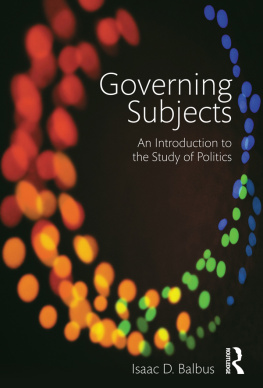GOVERNING SUBJECTS
This introduction to the study of politics highlights the ideas of key thinkers to illustrate how our whole lives are politically conditioned and subject to governance. Looking across every major component of the disciplineat law and institutions, markets and power, and culture and identitythis book encourages students to engage in critical thinking by evaluating arguments for their internal coherence and explanatory power. In addition, it helps them learn to think holistically as it demonstrates that none of these domains can be adequately understood without analyzing the other two. Indeed, the better we understand the connections between these three major areas of politics and governance, the better we understand politics as a whole.
Isaac D. Balbus is Professor of Political Science at the University of Illinois at Chicago. He is the author of four previous books and has won several awards for excellence in teaching.
GOVERNING SUBJECTS
An Introduction to the Study of Politics
Isaac D. Balbus
University of Illinois at Chicago
First published 2010
by Routledge
711 Third Ave, New York, NY 10017
Simultaneously published in the UK
by Routledge
2 Park Square, Milton Park, Abingdon, Oxon OX14 4RN
Routledge is an imprint of the Taylor & Francis Group, an informa business
2010 Taylor & Francis
Chapter 28 is a revised version of Chapter 10 in Mourning and Modernity: Essays in the Psychoanalysis of Contemporary Society (New York: Other Press, 2005), pp. 131-146 and is reproduced by kind permission of the publisher.
Typeset in MinionPro by
Prepress Projects Ltd, Perth, UK
All rights reserved. No part of this book may be reprinted or reproduced or utilised in any form or by any electronic, mechanical, or other means, now known or hereafter invented, including photocopying and recording, or in any information storage or retrieval system, without permission in writing from the publishers.
Trademark Notice: Product or corporate names may be trademarks or registered trademarks, and are used only for identification and explanation without intent to infringe.
Library of Congress Cataloging in Publication Data
Balbus, Isaac D.
Governing subjects : introduction to the study of politics /
Isaac D. Balbus.
p. cm.
Includes bibliographical references.
ISBN -13: 978-0-415-99889-5 (hardback : alk. paper)
ISBN -10: 0-415-99889-1 (hardback)
ISBN -13: 978-0-415-99890-1 (pbk. : alk. paper)
ISBN -10: 0-415-99890-5 (pbk.)
[etc.]
1. Political science. I. Title.
JA66.B27 2009
320--dc22
ISBN10: 0-415-99889-1 (hbk)
ISBN 10: 0-415-99890-5 (pbk)
ISBN10: 0-203-88144-3 (ebk)
ISBN13: 978-0-415-99889-5 (hbk)
ISBN 13: 978-0-415-99890-1 (pbk)
ISBN13: 978-0-203-88144-6 (ebk)
FOR MY SON, SIMON
CONTENTS
PART I
Law and Institutions
Part II
Markets and Power
Part III
Culture and Identity
Part IV
Conclusion
The seeds of this study were planted many years ago. In 1995 a series of faculty meetings devoted to the mission of the Department of Political Science at the University of Illinois at Chicago culminated in the conclusion that our undergraduate program should emphasize three substantive dimensions of politicslaw and institutions, markets and power, and culture and identity and that this emphasis would enable us to build bridges to other social sciences and humanities disciplines as a central part of an interdisciplinary liberal arts education. Shortly thereafter I was (in my capacity as Undergraduate Director) able to persuade my colleagues that we should develop a new, required introduction to the study of politics that was organized around the categories of our mission statement and that was consistent with its interdisciplinary commitment. This was to be a (relatively) small-section course that was team-taught twice a semester by four tenured or tenure-track faculty, each of whom would have primary responsibility for one part of the course, including a one-week introduction and a two-week conclusion that I taught for several years. The course was first taught in the fall of 1996, and over the course of nine years it managed to engage the participation of almost one-half of the faculty of the Department.
In 2005 the team-taught course met the budgetary axe and was transformed into a singly taught, large-section lecture class that was taught once a semester. Since that time I have taught it once a year. My version of the course is still organized around the categories of the original course: over the course of the semester I devote eight lectures each to Law and Institutions, Markets and Power, and Culture and Identity. I cover a great deal of ground in each of these sections of the coursesome of my students complain that I cover too much groundbut with only four weeks to devote to each of them there is, of course, a great deal of important material that I cannot include. Inevitably, the decision to include or exclude material is based at least as much on my own familiarity with that material as it is on its intrinsic significance. For example, in the section on Law and Institutions, I include the rule of law, the separation of powers, political parties, elections, and civil society, but I exclude Congress, the presidency, and bureaucracy. Similarly, and as the language of the previous sentence anticipates, most of my concrete, empirical references in that section and many in the remaining two sections are to the United States. Like any teacher, I teach what I know best, and there is much that I do not know. Thus the limits of time and my competence combine to yield a course of considerable but selective scope.
The same is true of the book that is based on this course. Twenty-four of its twenty-eight chapters are revised versions of the lectures I give in my introductory course. Four entirely new chapters rethink the material in the previous twenty-four but add relatively little new empirical content. Thus the content coverage of this book is as selective as the coverage of my course. More complete coverage would have required a much longer book, and this one is plenty long enough already. The reader will have to judge for herself whether the depth of the discussion compensates for the gaps in its breadth.
Since Governing Subjects is based on the course to which I have referred, my first thanks must go to the graduate students who have helped me teach it. Anika Bishka, Daniel Bliss, Clifford Deaton, John French, Dimitra Katsikidis, and Shannon Nelson have all served admirably as teaching assistants, helping Friday students make sense of my fast-paced Tuesday and Thursday lectures. Two of my research assistants, Clifford Deaton and Tony DiMaggio, read and commented usefully on earlier versions of the manuscript, and another assistant, Zach Gebhardt, contributed in innumerable and indispensable ways to its latest incarnation.
A number of friends and colleagues also deserve thanks for having read earlier drafts, including Ron Bayer, Dick Simpson, David Ingram, and Steven Engelmann. Their positive reactions helped persuade me that the revisions recommended by the readers for Routledge were worth the time and effort they would require. Steven was particularly helpful in encouraging me to revise in the direction on which I finally decided. And my editor at Routledge, Michael Kerns, was thoughtfully supportive from the beginning to the end of this project.












